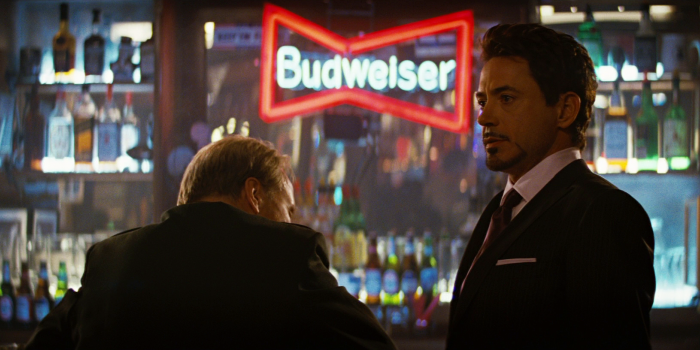
Editor’s Notes: Porch Stories is currently playing in Toronto at TIFF Bell Lightbox. For more on the film, read Matthew’s review.
Matthew Blevins: So what was it like going into your first foray into acting?
Laura Barrett: Whoa, what a question. Well, it was exciting, it was fun and it gave me a lot of insight into how much work goes in to any film. I know the basics of that, but just the day to day process of putting together a film, I loved getting that kind of behind the scenes experience. Checking out what crew was doing and just everyone’s responsibilities. I liked that. I liked the systems approach.
Matthew Blevins: How did you get in touch with Sarah and become involved in this project?
Laura Barrett: Great question. She approached me to audition. She had seen my live performances or videos thereof and thought “here’s somebody that creates rapport with an audience and can relate to people and somebody that enjoys performing”. I know that she was trying to cast her net wider in terms of non-actors or unconventional casting choices. I know that she asked other non-actors, obviously Jose included, to audition and I was game basically. I did want to be an actor when I was a child, I just didn’t go that path. The only acting I had done up until that point was in school plays.
Matthew Blevins: I think so many creative people have that ambition but maybe not the opportunities or the courage to actually do. It’s great that you got that opportunity and I think that you gave a very wonderful and naturalistic performance. I’ve watched the film twice in the past few weeks and I find the film very endearing, in large part due to the score that developed from the casting choices. I guess in the initial conceptual stages the main characters weren’t necessarily musicians.
Laura Barrett: Yes, I thought initially Emma was going to be a visual artist or a sculptor, so that evolved from the casting choices. That was fascinating to me as well, the process of collaborating and informing the script because it went through a bunch of edits once we were brought on. So that was great as well, not that we wrote the script but to be a part of that process.
Matthew Blevins: I think Sarah kind of let things unfold naturally and then had the talent and ability to harness that naturalism and turn it into something that was very cohesive and worked well. Particularly with the score that is very haunting and reflects the decision that Emma has to make between a more conservative buttoned down lifestyle and chasing the dreams that she thought she had to put away in her pursuit of “adulthood”.
Laura Barrett: Yeah, and I love the way that, it’s there, what you just said about choices and about paths. When I watch the movie it’s there but nobody ever hammers you over the head with it. I think that was a really great compliment about the music because the best scores should complement the narrative and enhance it without being too much and I think that in the music there’s that real spirit of indecision and melancholy and wistfulness and creative voice that’s really struggling with having made sort of the right stable choice that seems to lead in a direction that’s beneficial in the long run kind of thing. The music really underscores that spirit.
Matthew Blevins: The natural dynamic that you and Jose had together when you performed music together on screen, it’s almost as though they were able to immediately pick up where they left off using music for their conversation rather than words because I think it’s more expressive and really shows the true person that’s hiding behind the insecurities and indecisions.
Laura Barrett: Yeah, and I think that it’s something that maybe definitely sets apart music as an artistic medium from a lot of other mediums is its immediacy. Let’s say you were collaborating with someone on a visual piece, it might take days, weeks, months for you to get to that finished piece that’s exhibition ready but in terms of music it’s being made on the spot. Even if you don’t have a finished song you can get to a feeling pretty immediately. Not to say that all music that way or that all visual art is that way, writing similarly.
Matthew Blevins: So it’s introspective and personal versus music which inherently exposes those introspections and emotions but it puts them outward for others to hear and identify with and in the case of musical collaboration, respond to your own introspective take on whatever emotion you’re trying to convey with your music.
Laura Barrett: Totally, totally. In a sense it’s not, basically I feel like Stephan is not on an even playing field when it comes to Gabriel and Emma’s connection because they can so easily slip right back into this immediate emotional connection that is non-verbal, the shared language of music, they’ve got that and they’ll always have it. That’s why it’s so easy to come by when they see each other again in a single day they can get right back into it. It’s like riding a bike, they’ve never actually let that part go even though they’ve made other decisions romantically and that connection is still, it’s great for a filmmaker because you can simply include it and let it do its thing. It’s right there for you to see and witness. Then in terms of Jose and I, it was really easy to collaborate with him. We had known each other through the music scene at large but this was just a great opportunity to just make things happen on the spot. I find that I’m at my personal best when I’m given short deadlines, so being on set and actually sometimes working out those songs as improvisations on camera.
Matthew Blevins: Forced to be in the moment and be present I suppose. With Emma and the other women that were at different crossroads of love and relationships, it seems like you’re forced to make a decision that seems like it could dictate your identity for the rest of your life with these relationships. Do you think that was at the core of what Sarah was conveying with her film?
Laura Barrett: Yeah, I think that’s Sarah did really effectively with having three women at different stages of their lives. With the younger woman, she’s just starting to navigate a more adult world of relationships and she’s a little, I don’t want to say capricious, but she’s not sure yet what her guiding principles are. Even Emma is not quite sure. And then Maria who has lived and inhabited a relationship for decades. I find her to be a really fascinating character, because when you don’t get to know, there’s so much that is unsaid there. How did she and her husband navigate the ups and downs of not only their own marriage but seeing the neighborhood change and what is their place in a neighborhood that’s being gentrified. They’ve just seen so much and yet what is their place in the neighborhood at large when all these new people come in and change it in their image. Little Portugal in Toronto is not necessarily going to be Little Portugal forever because it’s turning into cafes and bars and clubs and fancy restaurants. There’s so much there for her to be commenting on, but she kind of keeps it in.
Matthew Blevins: Do we ever really ever figure out the ins and outs of interpersonal relationships? You can be with a person for your entire life and never truly know who they are because of the conceit that they make at the beginning of the relationship, like Laura putting her music away for Stephan and probably heading toward a life that would be unfulfilling.
Laura Barrett: But stable.
Matthew Blevins: You abandon your dreams and settle for a life of comfortable mediocrity. Where are you with those struggles in your own life?
Laura Barrett: At the end of the film I have my own interpretation as to what has happened. I think that when comparing myself to the character, I didn’t go to the side of stability that she did but I did experience a detour from creative expression as a career. I went back to school a few years ago and got my teaching certificate and I did a Master’s of teaching, which is a cross between a teaching degree and a research degree, so that was my world for two years. I barely gigged, I didn’t put out an album, I haven’t put out an album in several years and now I’m professionally certified as a teacher. I’m not working fulltime as a teacher, though, because the job situation in Ontario is pretty bad for that right now. But I’m working in education and the arts currently, so I’m trying to have it all.
Matthew Blevins: That’s great. You’ve gotta keep your feet in both worlds in a sense. The idea that you have to throw away your creativity to progress to the next level of adulthood is something that seems to be perpetuated by the uncreative. I may never reach the heights of a kalimba virtuoso but I might play acoustic guitar in a coffee house. I had never really seen anyone play that instrument that prevalently and it was a real eye opener. It seems like an extraordinarily expressive instrument that takes a tremendous amount of talent.
Laura Barrett: I’m not playing it in the traditional sense that players in musical cultures across Africa, because it’s not a set in stone instrument. Different musical traditions have different versions of that instrument, sometimes it’s called a karimbao a sanza or mbira. I wouldn’t call myself a virtuoso on it because that would imply that I’ve picked up on one of those schools of thought and musical traditions and really studied it. Instead I’m kind of self-taught, I’m playing it my own particular way but the instrument itself is so adaptive. Musical expression I think makes life, any kind of artistic expression, what else is your life going to paint if not beauty and art and appreciation of the world around you. It could be any medium, and the thing is that Emma has locked herself up and she doesn’t have to. She doesn’t know that. It’s so bizarre, I would never make the decision she made before the movie starts.
Matthew Blevins: I feel that perhaps there is an ambiguity as far as her fate and where she ends up in life, particularly the scene with the bicycle. Riding the bicycle through the sun, at that point maybe she’s realizing that she doesn’t have to make that decision right now but simply pursue life as it comes.
Laura Barrett: Yeah, maybe we shouldn’t include this in the interview, but I don’t think there’s a ring on her finger. I don’t think we get a shot of that on her bike but I know I wasn’t wearing one on set.
Matthew Blevins: That’s an interesting insight. Jose filled me in on the fact that the song that plays over the closing credits was supposed to be from the fictional band you two had collaborated on previously, so perhaps there’s another meta-contextual element hiding there.
Laura Barrett: Yes, it’s so cool. We had a lot of fun coming up with, originally we even made a band poster for the band with me and Jose and Margot the bass player.
Matthew Blevins: When did you first start playing the kalimba? It seems like an interesting choice for a musical instrument to master.
Laura Barrett: 2005. Honestly it’s become kind of apocryphal at this point but I was looking up other kinds of instruments. I wanted a portable digital instrument for perhaps drafting ideas while I was on the bus or subway. I was looking for something electronic but for whatever reason, I was looking on ebay and I found kalimbas, a far simpler one with only seven tines and I bought it and I worked out some tunes on it and experimented and realized that there were other forms, to be fair, are the generic version of a thumb harp or that style of instrument. I played a rather silly event in Toronto, it was a Weird Al tribute, so it was a bunch of people playing Weird Al covers and that’s came onto the scene, playing Smells like Nirvana on kalimba.
Matthew Blevins: That’s an amazing way to enter the music scene and it sounds like you’ve had a wonderful journey into music ever since. I’m thrilled that I got the opportunity to talk to you.
Laura Barrett: Thank you so much! Take care!



